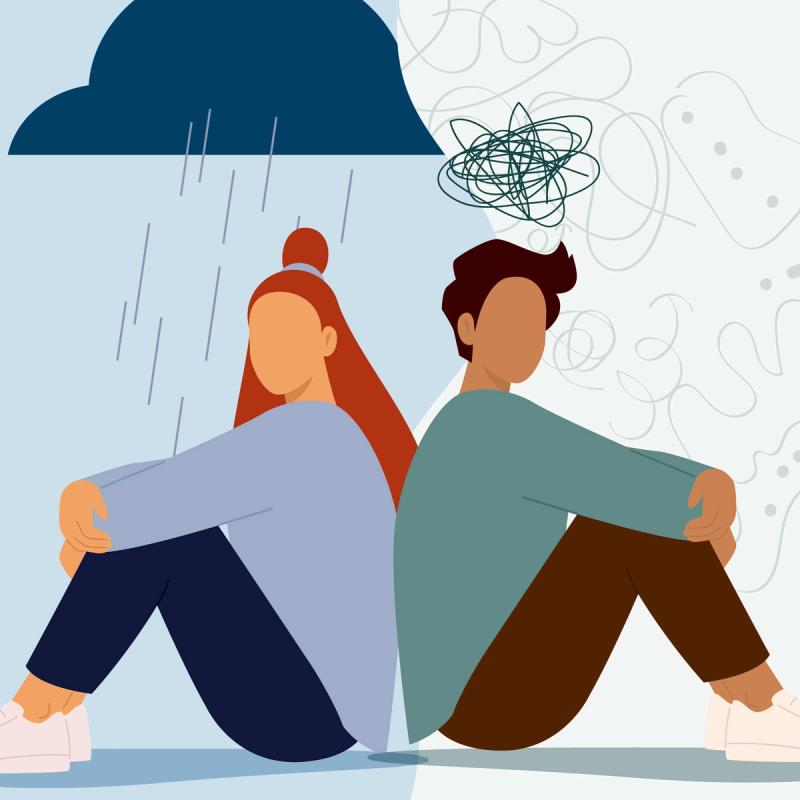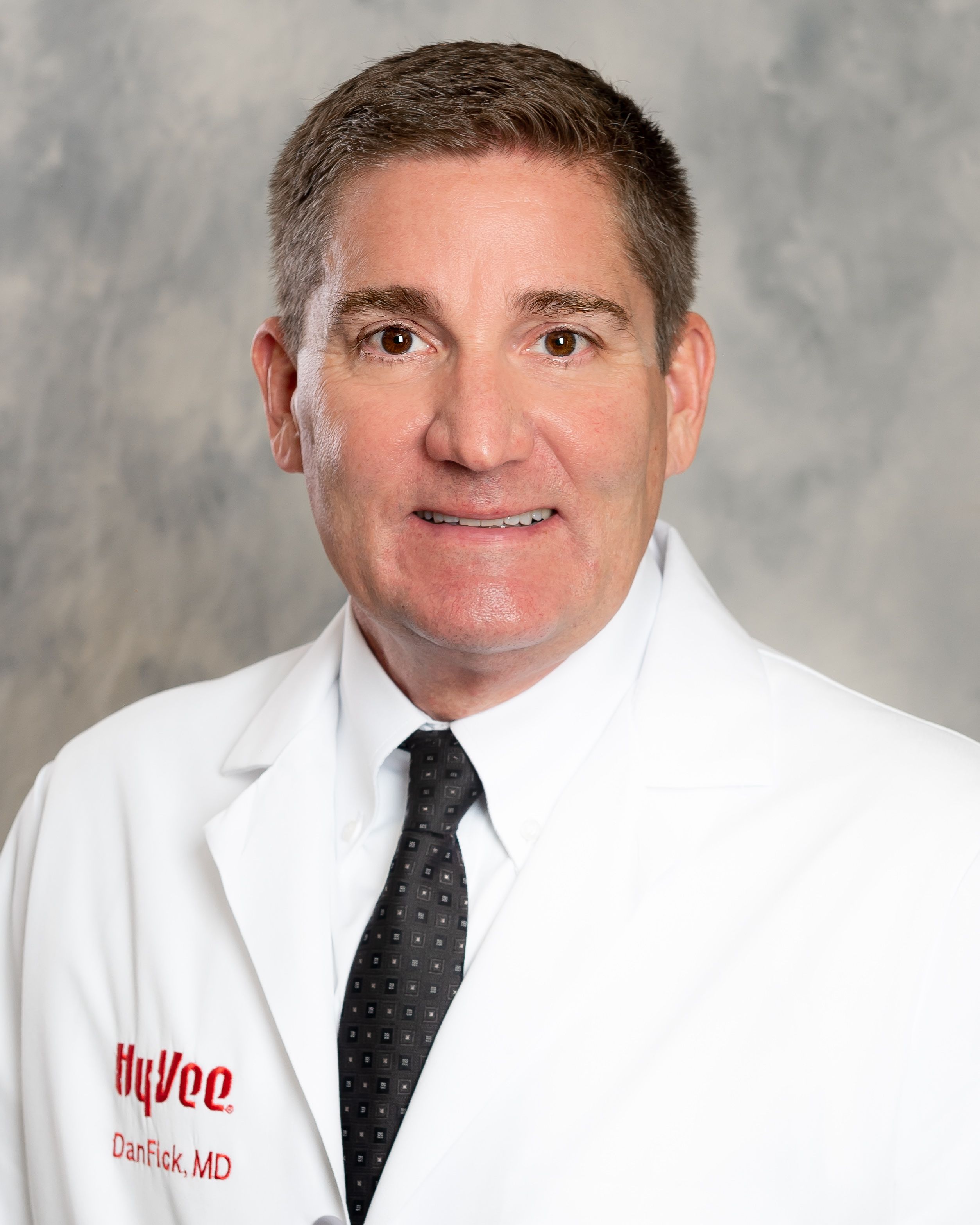Around 8 million American adults have been diagnosed with ADHD,1 and approximately 1 in 5 U.S. adults (18.4%) have been diagnosed with depression at some point in their lives.2 The prevalence of these two mental health conditions cannot be ignored. Many of the symptoms overlap, so what is the difference between depression and ADHD?
This blog will discuss the symptoms, treatments, similarities and differences between depression and ADHD.
This article includes mentions of suicide. If you are experiencing thoughts of suicide or self-harm, please get in touch with emergency services by calling 911 or 988.
Key Takeaways
Symptoms of ADHD and depression can overlap, but they are two different conditions. ADHD is tied to attention and impulse control, while depression is tied to mood and energy levels.
People with ADHD may feel discouraged or frustrated, but that does not always mean they’re depressed. Understanding what’s at the root of the symptoms is key.
Depression tends to cause a lack of motivation, while ADHD often involves trying to do too much at once and struggling to finish tasks.
Accurate diagnosis can take time. It’s important to look at when symptoms started, how long they’ve lasted and what’s causing the most disruption day to day.
What is depression?
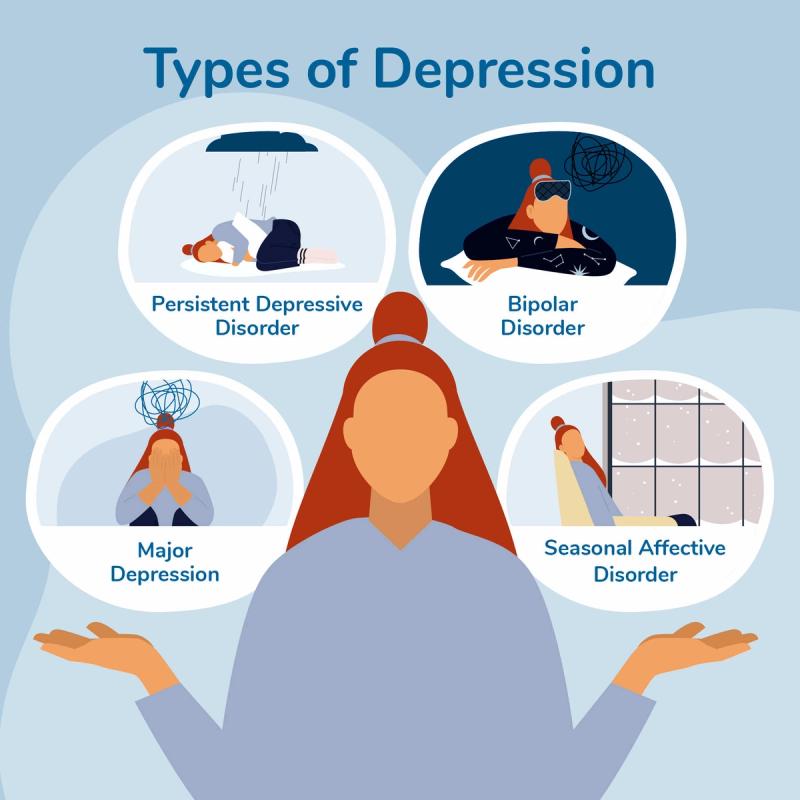
Depression is a common and serious medical illness. It is characterized by negative feelings or sadness that affect the way you feel, think and act. Depression can contribute to emotional and physical problems that decrease the ability to function at work, at home and in relationships.3
There are multiple types of depression that differ in their symptoms, including major depression, persistent depressive disorder, bipolar disorder, postpartum and seasonal affective disorder (SAD).4
Major depression
Major depression, also known as major depressive disorder, is characterized by experiencing depression symptoms most days and most of the time in a day. A diagnostic rule of thumb is experiencing symptoms for five or more days a week for two weeks or longer. Symptoms for major depression include:5
Loss of interest or pleasure in activities.
Weight loss or gain.
Trouble sleeping.
Feeling restless and agitated, or slowed down physically or mentally.
Being tired and without energy.
Feeling worthless or guilty.
Trouble concentrating or making decisions.
Thoughts of suicide.
Persistent depressive disorder
Persistent depressive disorder, also known as dysthymia or chronic major depression, is characterized by depression symptoms that last two years or longer. Symptoms of persistent depressive disorder include:6
Change in appetite.
Sleeping too much or too little.
Fatigue.
Low self-esteem.
Trouble concentrating or making decisions.
Feeling hopeless.
Bipolar disorder
Bipolar disorder, also known as manic depression, is characterized by changing moods and energy levels from low to high. The low phases show symptoms of major depression.7 The high phases are known as manic and have different symptoms. Symptoms of a manic episode include:8
Feeling very up, high, elated.
Irritability.
Feeling jumpy or wired, more active than usual.
Having a decreased need for sleep or sleeplessness.
Talking fast about a lot of different things.
Racing thoughts.
Having excessive appetite for food, drinking, sex or other pleasurable activities.
Feeling unusually important, talented or powerful.
Symptoms of depressive episode include:9
Feeling very down, sad or anxious.
Feeling slowed down or restless.
Trouble sleeping or sleeping too much.
Talking very slowly, feeling unable to find anything to say or forgetting a lot.
Having trouble concentrating or making decisions.
Feeling unable to do even simple things.
Having a lack of interest in almost all activities.
Feeling hopeless or worthless, or thinking about death or suicide.
Seasonal affective disorder (SAD)
Seasonal affective disorder, more commonly known as SAD, is a major depression that happens most often during the winter months. Symptoms are the same as major depression disorder but correlate with less sunshine.
Depression causes and risk factors
There is no single cause of depression, however, it can be triggered by certain events like grief, job loss, divorce or other major life changes.11 Depression can occur in any person and does not always reflect life circumstances.12
Risk factors for depression include:13
Biochemistry: The balance of chemicals in the brain may contribute to symptoms of depression.
Genetics: Depression can run in families.
Personality: Low self-esteem and pessimism raise the risk of depression.
Environmental factors: Continuous exposure to violence, neglect, abuse or poverty can lead to depression.
What is ADHD?
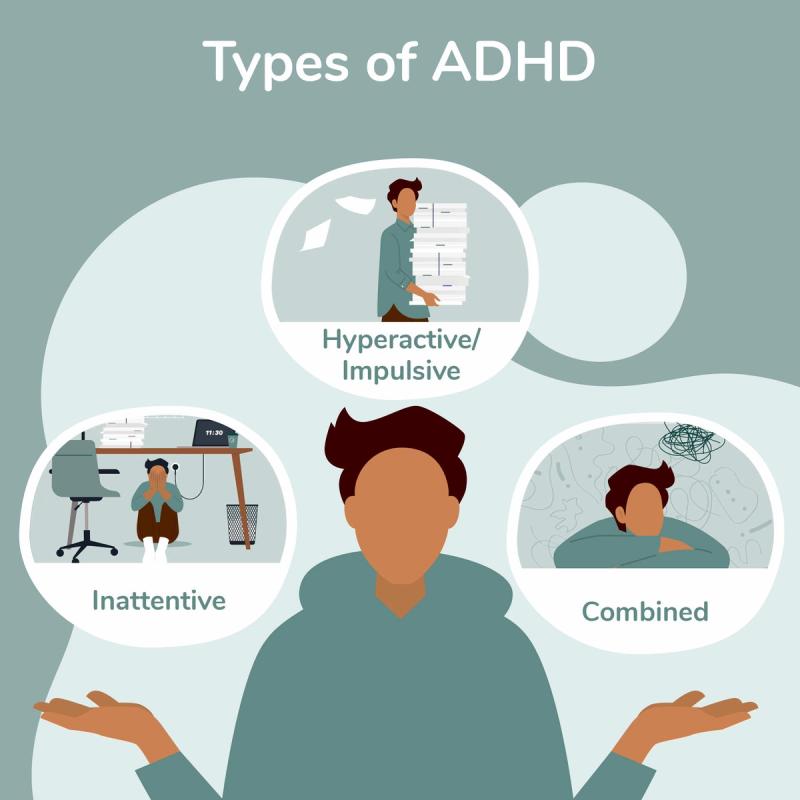
Attention Deficit Hyperactivity Disorder (ADHD) is a common mental and developmental disorder with the main symptoms being inattention, hyperactivity and impulsivity. There are three main types of ADHD:14
Predominantly inattentive presentation.
Predominantly hyperactive/impulsive presentation.
Combined presentation.
The main contributor to a diagnosis of ADHD is that the symptoms have caused a long-term disruption in the person's daily life and relationships.15 For a diagnosis of ADHD as an adult, the criteria are that they experience at least five persistent symptoms of ADHD, either inattentive or hyperactive symptoms. The symptoms must also be present in two settings, like work and home, for example.16
Inattentive ADHD type
The inattentive type of ADHD predominantly presents symptoms that relate to difficulty paying attention. Symptoms of inattentive ADHD include difficulty in:17
Paying close attention to details.
Making seemingly careless mistakes at work or during other activities.
Sustaining attention for long tasks.
Listening closely when spoken to directly.
Following instructions.
Completing duties in the workplace.
Organizing tasks and activities.
Managing time.
Losing things such as keys, wallet and phone.
Being easily distracted by unrelated thoughts or stimuli.
Being forgetful in daily activities (paying bills, keeping appointments, returning calls, etc.).
Hyperactive/Impulsive ADHD type
The hyperactive or impulsive type of ADHD predominantly presents symptoms of having too much energy or excessive talking. Symptoms of hyperactive or impulsive ADHD include:18
Experiencing extreme restlessness.
Difficulty sitting still for extended periods.
Fidgeting or squirming in a seat.
Being unable to engage quietly in leisure activities.
Talking excessively.
Answering questions before they are asked completely.
Interrupting or intruding on others.
Combined ADHD type
Some individuals meet diagnostic criteria for both inattentive and hyperactive ADHD. They fall into the combination category.
ADHD causes and risk factors
The causes of ADHD are unknown. Researchers theorize that it is a combination of factors that could includes genetics, environmental factors, nutrition, brain injuries and social environments.19
Risk factors for ADHD in adults include:20
Blood relative with an ADHD diagnosis.
Alcohol use, smoking or drug use during pregnancy.
Brain injuries.
Exposure to toxic substances in the environment (such as lead) in the womb or during childhood.
Premature birth and low birth weight.
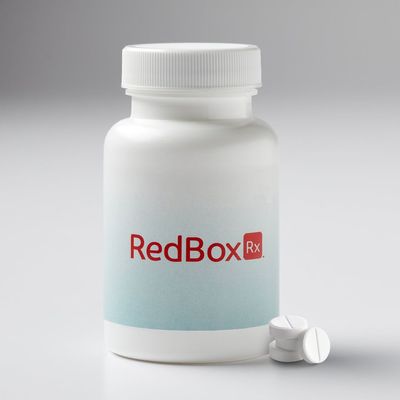
Your mental health is important.
RedBox Rx offers convenient online mental health treatment with affordable FDA-approved medications shipped to your door.
Get StartedCan you have both depression and ADHD?
One in three people diagnosed with ADHD also have depression. Sometimes, the two conditions just happen to co-exist. Other times, struggles with ADHD can lead to depression through feelings of worthlessness or anxiety.
In some cases, ADHD symptoms can be misdiagnosed as depression. For example, loss of interest in activities is a common depression symptom. However, people with ADHD can also experience a loss of interest in activities, but it is for different reasons. The main difference is those with depression often struggle to find interest in any activities, while those with ADHD may just get bored with an activity. Depression is more mood based and ADHD is more susceptible to external factors.21
Depression and ADHD treatment options
There are a variety of treatments for depression and ADHD, with some options for treating both conditions. The three major categories of treatments are medication, therapy and lifestyle changes.
Medications
Medication is one of the most common forms of treatment for depression and ADHD.
Medications for depression
Brain chemistry can be a contributing factor to depression. Medication helps balance certain chemicals in the brain to relieve symptoms of depression. Medications for depression include:
Selective serotonin reuptake inhibitors (SSRIs): Fluoxetine (Prozac®), paroxetine (Paxil®), sertraline (Zoloft®), citalopram (Celexa®) and escitalopram (Lexapro®).
Serotonin and norepinephrine reuptake inhibitors (SNRIs): Duloxetine (Cymbalta®), venlafaxine ER (Effexor XR®), desvenlafaxine (Pristiq®) and levomilnacipran (Fetzima®).
Atypical antidepressants: Bupropion (Wellbutrin®), trazodone (Desyrel®), mirtazapine (Remeron®), vortioxetine (Trintellix®) and vilazodone (Viibryd®).
Tricyclic antidepressants: Imipramine, nortriptyline (Pamelor®), amitriptyline (Elavil®), doxepin and desipramine (Norpramin®).
Medications for ADHD
Medication types for ADHD include:22
Stimulants: Amphetamine dextroamphetamine salts (Adderall XR®), amphetamine sulfate (Evekeo®), methylphenidate (Ritalin®, Concerta®, Quillivant XR®), amphetamine (Adenyz®, Dynavel XR®), dextroamphetamine (Zenzedi®, Dexedrine®), lisdexamfetamine (Vyvanse®), methamphetamine (Desoxyn®), dexmethylphenidate (Focalin®).23
Nonstimulants: Atomoxetine (Strattera®), guanfacine (Intuniv®), Bupropion (Wellbutrin®), lisdexamfetamine dimesylate (Vyvanse®), clonidine (Kapvay®), viloxazine (Qelbree®).
Medications for depression and ADHD
Many antidepressants treat depression and ADHD. Some of the most common include bupropion (Wellbutrin®) and venlafaxine (Effexor®), and tricyclic antidepressants like desipramine (Norpramin®) or imipramine (Tofranil®).24
Therapy
Therapy is an effective tool for treating depression and ADHD. Some styles of therapy to consider include:
Psychotherapy.25 Also known as talk therapy, it can be combined with many other forms of therapy.
Cognitive behavior therapy (CBT).26 A form of talk therapy, CBT helps you change your thoughts and actions to be in more control of your life.
Family education and therapy.27 This can help you better manage relationships in your life, and understand how your condition and behavior affects relationships in your life.
Lifestyle
Certain lifestyle changes have shown to be helpful in managing symptoms of depression and ADHD while also just making it easier to cope with the stress of life. Some of these techniques include:28
Mindfulness and relaxation.29
Dietary changes.30
Exercise.
Prioritize sleep.
Practice gratitude.
Set goals and priorities.
Focus on positivity.
Stay connected with friends, family, community.31
How RedBox Rx can help
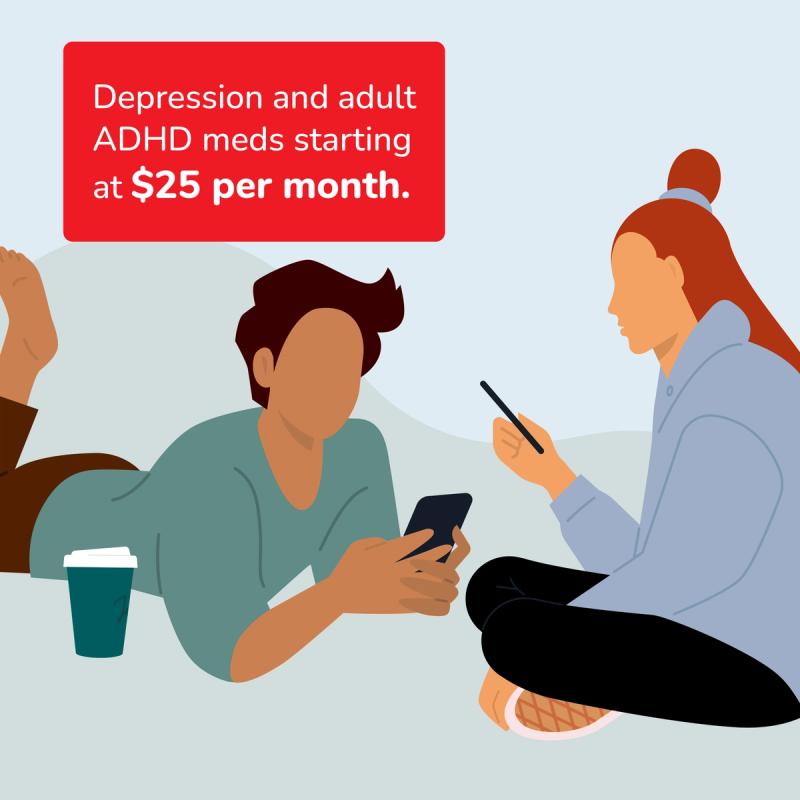
RedBox Rx makes evaluation and treatment easy and affordable. We offer secure, private online consultations with licensed providers focused on your health.
Benefits of RedBox Rx include:
Transparent, affordable, flat rates. Medications for $25 per month (with purchase of three-month supply).
$35 consultations with a U.S. licensed medical professional.
No insurance required. No membership fees. FSA and HSA eligible.
No office wait times or scheduling issues typical with physical medical practices. Schedule a virtual consult in as little as an hour.
FREE shipping directly to you. Monthly and quarterly subscriptions available.
Get started on your mental health treatment journey with our online assessment for depression or ADHD.
If you are experiencing suicidal or self-harm thoughts, please reach out immediately to a health care provider, call the National Suicide Prevention Lifeline at 1-800-273-8255, or call the Suicide and Crisis line at 988.

